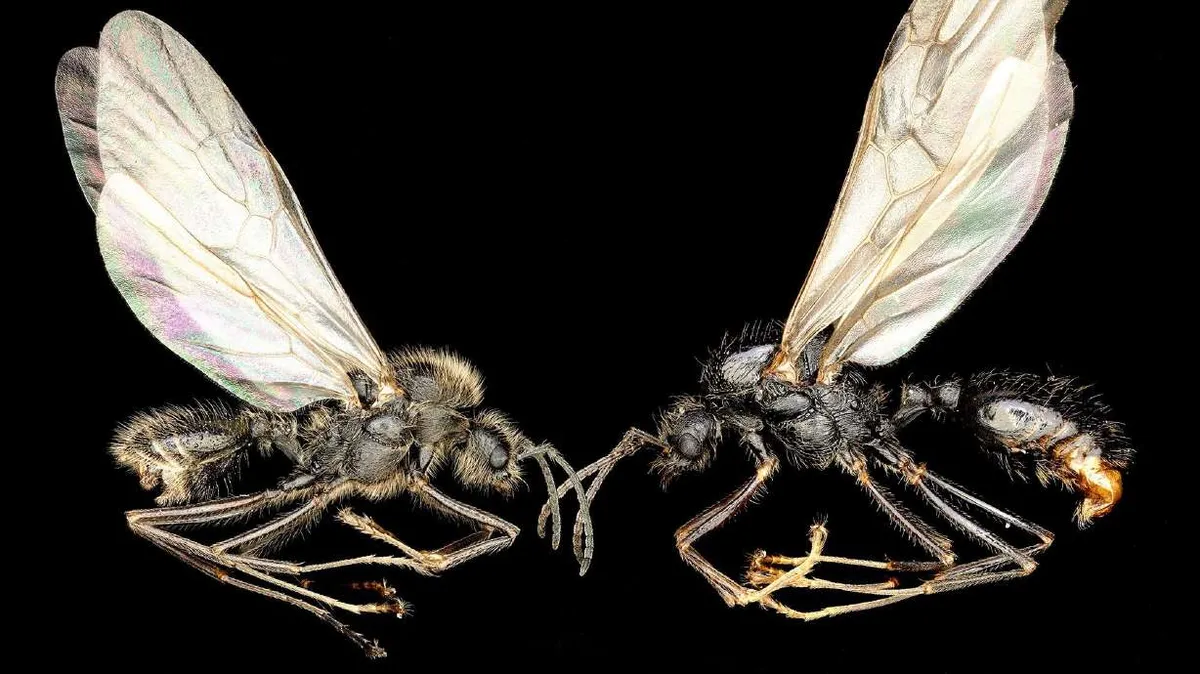
MONTPELLIER, France — A groundbreaking discovery by researchers at the University of Montpellier has revealed an extraordinary survival strategy utilized by Iberian harvester ants, scientifically known as Messor ibericus. This remarkable species possesses the ability to produce eggs that develop into two distinct ant species, challenging conventional understandings of ant reproduction. The study, published on September 3 in the prestigious journal Nature, explores the intricate reproductive traits of these ants while investigating the mystery surrounding a missing ant species.
While conducting research on the Iberian harvester ants, the team discovered preliminary data suggesting that these ants were hybridizing with another species, Messor structor, in the Mediterranean region. However, a significant challenge arose: the colony in question was located on the Italian island of Sicily, approximately 621 miles away from the nearest known Messor structor population. Jonathan Romiguier, a senior researcher at the University of Montpellier and the lead author of the study, noted, "We had a strong suspicion that something was very unusual about this species, but we were far from imagining just how unusual it really was." This paradox spurred the team to delve deeper into their investigation.
Over five years, researchers examined more than 120 ant populations across Europe, sequencing the genomes of hundreds of ant specimens. Their efforts culminated in an astonishing revelation: Iberian harvester queens can produce two different species of ant—one hairy and one virtually hairless—from the eggs they lay. The study uncovered that these queens can adjust egg development based on the colony's needs—either producing future queens or hybrid worker ants, which constitute 99% of the colony's population. This finding fundamentally alters the scientific community's understanding of ant reproduction.
Jessica Purcell, an assistant professor in the Department of Entomology at the University of California, Riverside, has encountered Iberian harvester ants during her studies of other ant species in Italy. Although she was not involved in the new research, she contributed an accompanying article. Purcell explains that harvester ants are known to collect seeds from various plants, creating distinctive vegetation-free circles around their nests. This unique behavior contributes to the visual identity of their habitats.
According to the study, Messor ibericus and Messor structor once belonged to the same species, diverging more than 5 million years ago. Despite their separation, both species cohabitated in Europe, particularly in regions like eastern France. The research suggests that at some point, Iberian harvester ant queens lost the ability to produce their own worker ants. This evolutionary adaptation led them to mate with nearby Messor structor populations to ensure a workforce of hybrid ants.
Romiguier speculated that this phenomenon may stem from an evolutionary conflict between queens and larvae, driven by a "selfish" genetic element that favors the production of queens. This led to Iberian harvester ants relying on Messor structor for survival, engaging in what is known as sperm parasitism. Rather than relying solely on mating with wild males, these ants developed a novel reproductive strategy: cloning the sperm of Messor structor, a process termed sexual domestication. "Much like humanity domesticating livestock, they eventually gained control over the reproduction of these males they once exploited in the wild," Romiguier explained.
This reproductive strategy enabled the Iberian harvester ants to maintain a lineage of cloned male Messor structor ants within their nests. This approach eliminated the necessity for geographical proximity to another species, resulting in millions of invasive hybrid worker ants spreading across the Mediterranean.
The findings reveal that Iberian harvester ants exemplify a new mode of reproduction termed xenoparous, where "xeno-" signifies foreign or strange, and "-parous" means to produce or give birth. Romiguier noted that this research marks the first documented evolution of xenoparity, showcasing the necessity of propagating another species' genome through the queen's own eggs. This unique reproductive strategy underscores the complexity of ant biology and evolution.
Through genome sequencing, researchers determined that the only pure Iberian harvester ants are the queens and males capable of mating to produce future queens. Hybrid female workers arise from eggs fertilized with Messor structor sperm. The study revealed that queens can clone the genetic material of males stored within their bodies, effectively deleting their nuclear DNA and relying almost exclusively on the sperm's DNA for reproduction. Interestingly, these cloned males exhibit differences from those produced by Messor structor queens, possessing unique mitochondrial DNA.
During their two years of laboratory observation, the research team documented the birth of two distinct species of males from a single queen, confirming the remarkable reproductive capabilities of Iberian harvester ants. The researchers plan to investigate the cellular mechanisms underlying this cross-species cloning process, seeking to understand how maternal genetic material is eliminated from the ovum.
While hybrid offspring and androgenesis have been studied in other ant species, the combination of both in Iberian harvester ants presents a new frontier in entomological research. Dr. Jacobus J. Boomsma, a professor at the University of Copenhagen, emphasized that these adaptations likely confer a competitive advantage, allowing Iberian harvester ants to expand their range significantly.
Despite the intriguing findings, experts caution that the long-term survival of Messor ibericus may be at risk due to reduced genetic variation. Purcell highlighted the novelty of the discovery and the potential for future research to uncover further mysteries of this unique reproductive system. As scientists continue to explore the intricate world of Iberian harvester ants, they may unlock new insights into evolutionary biology and ant behavior.